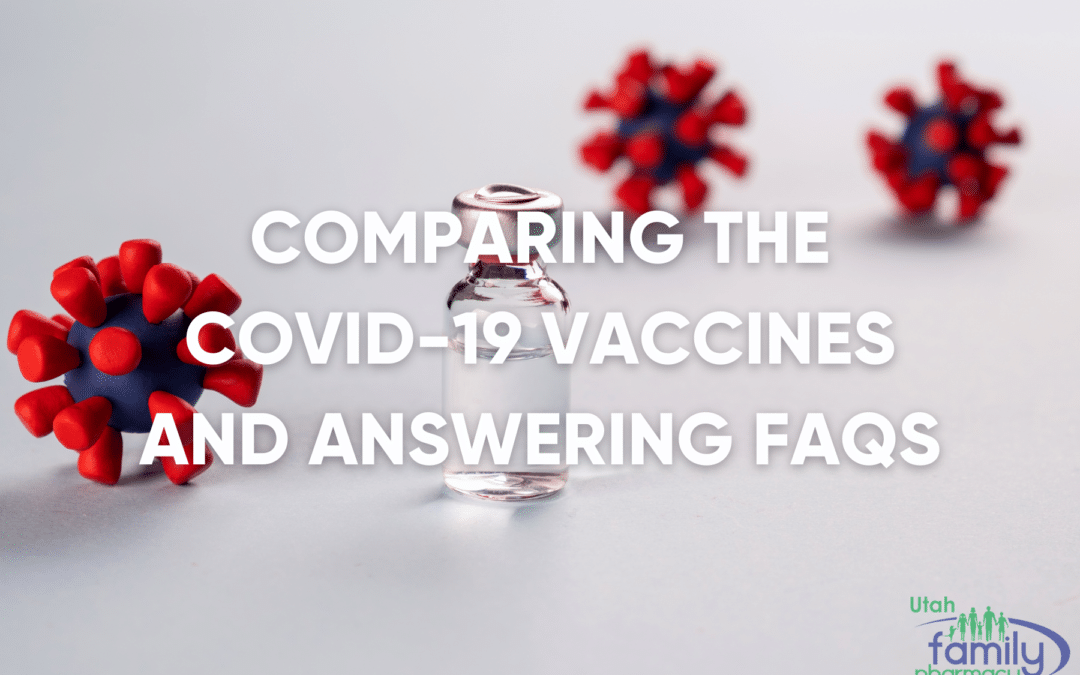If you’re still deciding whether or not to get the vaccine, or are comparing the COVID-19 vaccines, we’re answering all of the FAQs for you at Utah Family Pharmacy!
When the vaccines first started being administered, it felt like a huge relief after the pandemic had been surging for almost a year. Weeks passing, more reports were made public about the vaccines and their effectiveness.
It’s smart to stay up to date on the different vaccines being administered and steering clear of any misinformation circulating. With so much information out there, we want to help those comparing the COVID-19 vaccines and start answering FAQs.
What’s the difference between them? Let’s go over what we know as of now.
There’s three different vaccines being administered in the US right now:
- Pfizer-BioNTech
- Moderna
- Johnson & Johnson
There’s a few others currently on track to start administration as well. Though some people only have one vaccine available to them, it’s a good idea to know how each of them differ.
That being said, below we’ll begin comparing the COVID-19 vaccines currently available, as well as answer frequently asked questions about them.
Comparing the Differences Between the COVID-19 Vaccines
In December of 2020, the FDA authorized an emergency administration of the first two COVID-19 vaccines located in the US. One of which was Pfizer, produced by BioNTech, the other was the Moderna vaccine. Both of these vaccines are administered in two doses.
Then in late February, a third vaccine by Johnson & Johnson’s Janssen Biotech division was approved by the FDA. This vaccine is administered in one single dose,
All of these vaccines are extremely effective to prevent the population from getting severely sick, hospitalized, or even die from contracting COVID-19.
Both the Pfizer and Moderna vaccines are made by using a messenger RNA, or mRNA technology.
In the past, vaccines were made from either a weakened, or inactivated germ. It’s purpose was to train the immune system on how to fight off infection in case of a contraction of that virus later on.
mRNA vaccines are slightly different: teaching the human body cells how to make a harmless piece of a protein — a “spike protein” — that’s also found on the surface of the coronavirus.
Once the protein piece comes to the surface of a cell, the human’s immune system will recognize it and start to create antibodies for it. These antibodies create protection for you if you’re ever exposed to the virus.
One difference between the Pfizer and Moderna vaccines is the wait time between the two required doses: Pfizer’s are given 21 days apart, while the Moderna shots are given 28 days apart.
The One Dose Vaccine
Now, the vaccine created by Johnson & Johnson looks isn’t the same. They developed something called a viral vector vaccine. This form of vaccine has been previously used to fight other diseases.
In short, this form uses a slightly altered and harmless version of the common cold virus. It’s non-replicating, called adenovirus type 26. It’s job is to introduce the genetic instructions for that “spike protein.”
The body’s immune system will then respond by creating antibodies that are made to protect you if you contract SARS-CoV-2, the virus that causes COVID-19.
This single dose vaccine by Johnson & Johnson, unlike Pfizer and Moderna, can be stored regularly in a fridge. Where the other two must be both stored and transported at temperatures below freezing.
What are the known side effects of the COVID vaccines?
When it comes to getting any vaccine, side effects aren’t really unheard of. That’s why it shouldn’t be a scare tactic saying there’s possible side effects with the COVID-19 vaccine.
The body’s immune reaction can look the same with this vaccine as it would with others.
These common side effects include:
- Fatigue
- Sore Arm
- Fever
- Chills
- Headache
It’s said by an internal medicine specialist and immunologist Dr. Neeta Ogden, “This is expected. People should maybe think about vaccinating on weekends, for example,” she said.
“You probably might need to take a day off from work. … This is predictable and I don’t think that it is alarming.”
Though not every person will undergo side effects from the COVID-19 vaccine, but it’s important to know that if you do it’s very normal and that shouldn’t discourage you from receiving the vaccine.
Do the COVID vaccines protect against new strains?
Currently there are health officials who track the spread of multiple variants of COVID-19 in the world. Currently there’s a highly contagious version that’s been found in South Africa and another found in the United Kingdom.
Citing preliminary studies, the CDC said the Pfizer and Moderna vaccines show signs of recognizing and protecting against those variants.
“I do think that the existing vaccines are going to offer reasonable protection against these new variants,” Dr. Scott Gottlieb, former head of the FDA.
He added that they are likely to be about 20% less effective against the new strains from Brazil and South Africa.
Vaccine researchers are working on developing possible booster shots to combat variants if needed in the future.
With the new Oxford-AstraZeneca vaccine being suspended in South Africa, due to the fact of concerns that the vaccine isn’t as effective against variants located there.
Is there anyone who shouldn’t get the COVID-19 Vaccine?
Similar to most vaccines, the COVID vaccine might not be right for everyone to receive. As the CDC says people allergic to the ingredient polyethylene glycol (PEG) or polysorbate, should not get an mRNA COVID vaccine.
Also, anyone who has an immediate allergic reaction to the first dose should not get the second one.
With a small number of people who underwent adverse reactions, like anaphylaxis, after getting their first dose. All have recovered.
If you have a past of allergic reactions to getting a vaccine, or other injectable therapy for a disease you should definitely speak with your doctor before choosing to receive the COVID-19 vaccine.
If you’re someone with food allergies, you don’t have to worry about getting the vaccine and having an allergic reaction.
Do you still have to wear a mask after getting the COVID-19 vaccine?
After getting the vaccine, it does take up to two weeks for your body to develop it’s immunity. Meaning you should most definitely keep taking the needed precautions against the virus. Such as social distancing and yes, continuing to wear a mask.
This helps reduce your risk of getting infected before the vaccine has built up your immunity.
After that two week timeframe, the CDC states that it is safe for fully vaccinated people to get together indoors, without masks, with others who are also fully vaccinated.
Though it’s important to know that health officials still believe everyone should be wearing a mask in public places, even after you’re vaccinated.
Hopefully in the near future with vaccine rates rising, infection rates will continue to decline and life will become safe enough to ease up on these safety guidelines against COVID-19.
Get Vaccinated at Utah Family Pharmacy
Currently at Utah Family Pharmacy, we are scheduling for the public to receive the COVID-19 vaccines at all three locations!
After comparing the COVID-19 vaccines and answering all of your FAQs, we hope you’ll help stop the spread of the virus and get life back to normal in the future.
Visit our website to schedule your vaccine appointment today!


Recent Comments